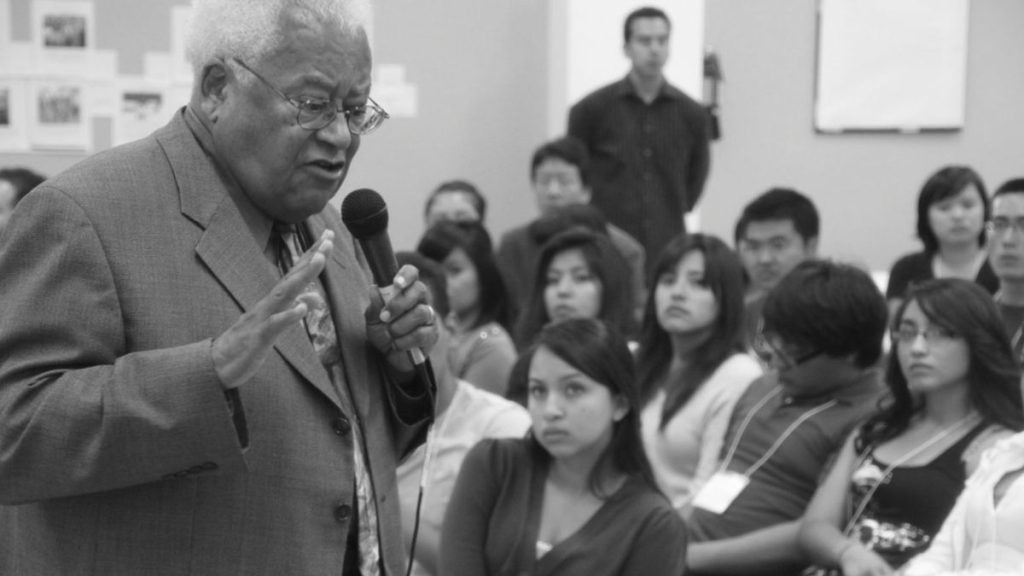The Rev. James Lawson speaks to Dream Summer students. UCLA photo
By Clint Confehr
NASHVILLE, TN — Follow Black Lives Matter to promote civil rights, a 92-year-old Methodist pastor said during a recently-streamed program by the local Interdenominational Ministerial Fellowship.
That preacher surely knows, having mentored students at Historically Black Colleges and Universities here. Several went on to form the Student Nonviolent Coordinating Committee (SNCC) and desegregate lunch counters.
SNCC embraces BLM.
https://snccdigital.org/today/controlling-narrative/
The Rev. James Lawson Jr. urged IMF viewers to “emulate Black Lives Matter as we move the civil rights movement … to the day when we will indeed see a society where every boy and girl born into this society … will be met with full access to the tree of life.
“That’s why God created the human race,” Lawson said. His message was introduced by U.S. Rep. Jim Cooper for one of five IMF programs aired Jan. 18 to “Celebrate the Life and Legacy of Rev. Dr. Martin Luther King Jr. and the Honorable Rep. John Lewis.”
Lawson “actually taught King pretty much everything John knew” about nonviolent protest, Cooper said in the IMF video, calling the late congressman his “dear friend.” Lawson’s Tennessee roots reach Scott Chapel 55 miles south of Fisk University to Shelbyville where he pastored the congregation’s 1961 church construction forced by urban renewal. Shelbyville is Cooper’s hometown.
Lawson’s nonviolent resistance classes started near Fisk at Clark Memorial Methodist Church.
Lewis “loved his days here as a student, and loved coming back and seeing the growth and progress that Nashville has,” Cooper said. “John was a part of that growth. His good trouble, passionate advocacy, his risking his own life for our better future … helped us listen to the better angles of our nature.”
Lawson’s workshops on non-violence are mentioned in David Halberstan’s book, “The Children.” Lawson was “mistreated” by Vanderbilt University, Cooper said. Stanford’s King Institute states “In March 1960, Lawson was expelled from Vanderbilt because of his involvement with Nashville’s desegregation movement.” Nearly a year later, an Easter weekend meeting of students — encouraged by King and then SCLC executive director Ella Baker — led to SNCC. Stanford names Lewis, Diane Nash, Marion Barry, Bernard Lafayette and James Bevel as early SNCC leaders.
In the IMF’s program Lawson says Martin Luther King Day is to “celebrate my dear friend.” After pastoring Scott Chapel, Lawson worked at Centenary Methodist Church in Memphis and asked King to march with striking sanitation workers.
Martin Luther King III says in the program he wants IMF to “be successful in realizing the dream my father had for freedom, justice and equality for all.”
The National Civil Rights Museum in Memphis presented a “Mighty Story Time” for children. Museum Educator Dory Lerner read “My Uncle Martin’s Big Heart” by Dr. Angela Farris Watkins. King’s niece wrote that in her family he was known as “M.L.”
Watkins, an associate professor of psychology at Spelman College, wrote King “came home one day …[and] … fell asleep on the couch with his shoes on.” Her mother wouldn’t let her do that, but it seems the “ordinary man with an extraordinary love” was very tired that day.
Also for MLK Day, the Nashville Symphony presented a choral performance of “We Are Nashville.” The program included a recitation by Nashville Youth Poet Laureate Marie Shields of Overton High School. Exploring her Black identity, she said, blackness doesn’t always act as expected, and she’s been told she “talks white.”
During IMF’s 32nd Annual MLK Day Youth Symposium, Metro Schools Director Sharon Gentry acknowledged students feel disenfranchised and asked them to “stay engaged … your time is coming.”
Also Jan. 18, James Story, Gallatin’s Citizen of the Year, was the grand marshall of the Martin Luther King Jr. Unity Day Car Procession. First Baptist Church Pastor Derrick Jackson spoke to participants listening on car radios during an outside celebration.


